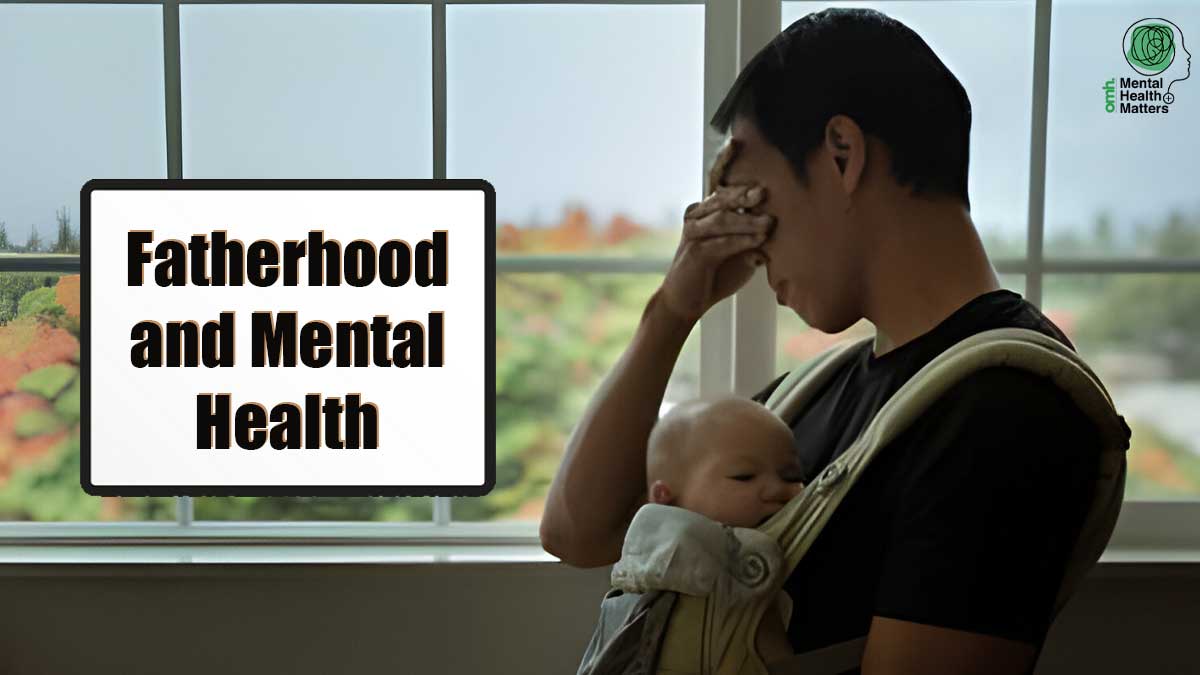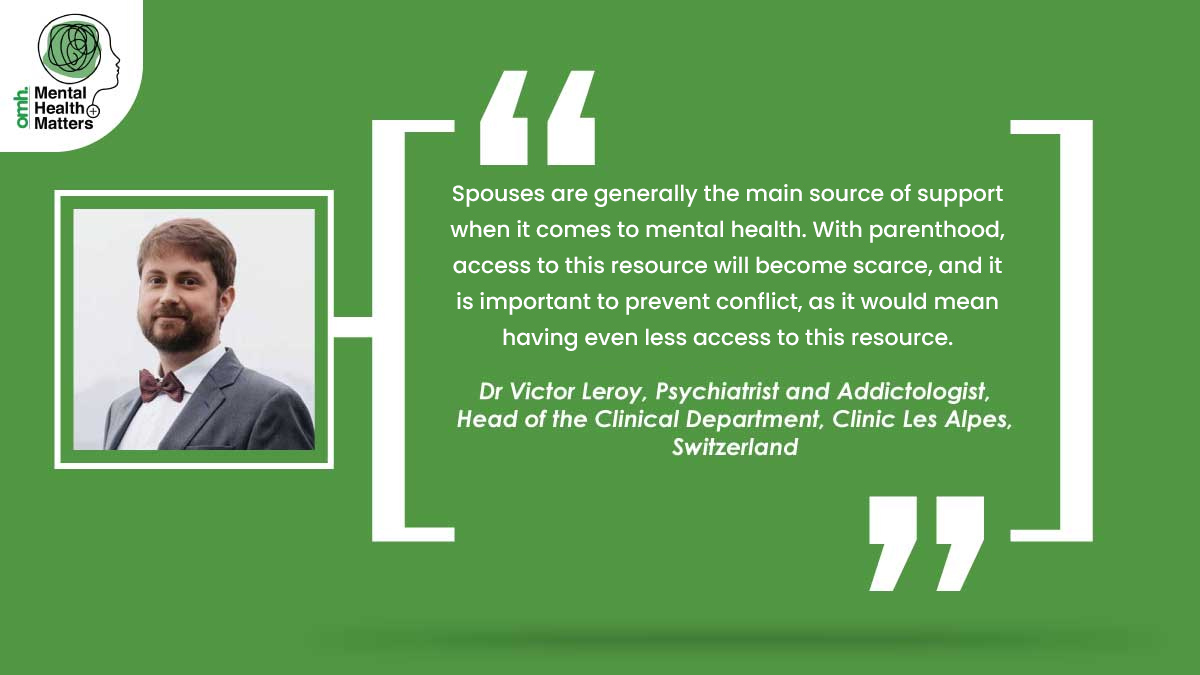
The transition to fatherhood is a 'beginning of time' old situation, yet it has not been a subject of interest in modern societies. This transition is one of the big milestones in one’s life, and we know that mental health conditions and challenges tend to occur around these thresholds (wedding, divorce, children leaving the nest, retirement, death of loved ones). This week in our 'Mental Health Matters' campaign, we spoke to Dr Victor Leroy, Psychiatrist and Addictologist, Head of the Clinical Department, Clinic Les Alpes, Switzerland, who explained these challenges and how to manage them.
Table of Content:-
“The taboo about postpartum depression among young mothers has been addressed for a few years only, the stigma around mental health conditions among men will take time to be addressed as well,” said Dr Leroy.
Mental Health Challenges Among New Parents

“Regarding new parents, numbers are the subject of heavy debate. Literature shows that no less than 30% of women and 10% of men are suffering from depression in the weeks after the arrival of a newborn,” said Dr Leroy.
He added, “Anxious disorders’ prevalence is debated, but experts agree on a prevalence of more than 2/3 of young parents experiencing anxious symptoms in the form of fear of impulsion and ruminations keeping them awake at night.”
Impact on Couple's Mental Health

During this period, a significant challenge lies in the mental well-being of the couple. The arrival of a baby can strain their relationship and affect their mental health. Dr Leroy added, “Increased participation by the father in household chores, for instance, can alleviate the severity of postpartum depression. Moreover, anxiety symptoms in one parent may heighten the likelihood of similar symptoms emerging in the other parent.”
Generational Parenting Divide

“The current problem of millennials and Gen Z fathers is the lack of representation. Less than 10% of fathers ever changed diapers in past generations. However, now with Millennial and Gen Z fathers, less than 10% have never changed a diaper, inversing the statistic completely,” said Dr Leroy.
“This generational gap in parenting involvement contributes to misunderstandings and a lack of support for younger parents. Similar challenges are observed among women: recent research indicates that Millennial mothers who work 9-5 spend more quality time with their children compared to their stay-at-home counterparts from previous generations,” highlighted Dr Leroy.
The American Journal of Lifestyle Medicine reports that approximately 10% of men experience paternal postpartum depression from the first trimester to the first year after childbirth, with the highest incidence occurring between 3-6 months postpartum. This rate is significantly higher compared to the general population of adults of parenting age. Moreover, paternal postpartum depression occurs at approximately half the rate of maternal postpartum depression (21.9% of mothers during the first year postpartum).
Social Costs of Parental Involvement
Pop culture recently offered good examples of millennial fathers, both impersonated by Pedro Pascal in The Mandalorian and The Last Of Us.
“However, this active engagement in household chores and parenting by Millennial and Gen Z fathers comes at a significant social cost: companies often deny fathers part-time work opportunities, a privilege more readily granted to women,” said Dr Leroy. This disparity can result in reduced self-esteem, and feelings of guilt, and eventually contribute to depressive symptoms.
According to the Australian Institute of Family Studies, children of fathers with a mental illness are at a higher risk of experiencing emotional (internalising) and behavioural (externalising) problems compared to children without such familial history. They also have an increased likelihood of being diagnosed with a mental illness themselves.
Anticipating Stressors for Improved Mental Health
To enhance the mental health of new parents, it's crucial to anticipate potential stressors. A significant study led by James McHale and detailed in the book "Charting the Bumpy Road of Coparenthood" has pinpointed key issues that, if addressed during pregnancy, can mitigate conflicts among parents in the child's early years.
Here is the list of the arguments you should have with your partner while buying a baby’s bed:
- Sleeping arrangements: Should our baby sleep separately in our room until at least six months old?
- Pacifiers: Are we comfortable with our baby using one?
- Family involvement: Do we welcome visits from relatives during the first month? How much weight do we give to their opinions on parenting?
- Shared responsibilities: Am I reliable in sharing household chores?
- Child rearing: How will we manage our child's tantrums? What disciplinary methods do we agree on?
These proactive discussions can help preempt potential conflicts and foster a supportive environment for both parents.
Seeking Support and Reconnecting

Spouses are generally the main source of support when it comes to mental health. With parenthood, access to this resource will become scarce, and it is important to prevent conflict, as it would mean having even less access to this resource.
“Many young parents frequently express feelings of loneliness, isolation, and a sense of being misunderstood, which can hinder their access to necessary support and care. Reestablishing connections is crucial. This could involve listening to podcasts, reconnecting with old friends who have also become parents and understanding their experiences, or seeking community support and finding comfort in shared discussions about parenting challenges,” highlighted Dr Leroy.
Accessing Professional Guidance

“If these challenges weren't anticipated during pregnancy and your baby is now three months old, don't worry! The professionals caring for your child are equipped to provide guidance and support. Whether through the paediatric nurse's understanding of parental needs or discussing parenthood challenges with a paediatrician as your child grows older, they are there to assist you every step of the way,” highlighted Dr Leroy.
[Disclaimer: This article contains information provided by an expert and is for informational purposes only. Hence, we advise you to consult your own professional if you are dealing with any mental health issues to avoid complications.]
Also watch this video
How we keep this article up to date:
We work with experts and keep a close eye on the latest in health and wellness. Whenever there is a new research or helpful information, we update our articles with accurate and useful advice.
Current Version